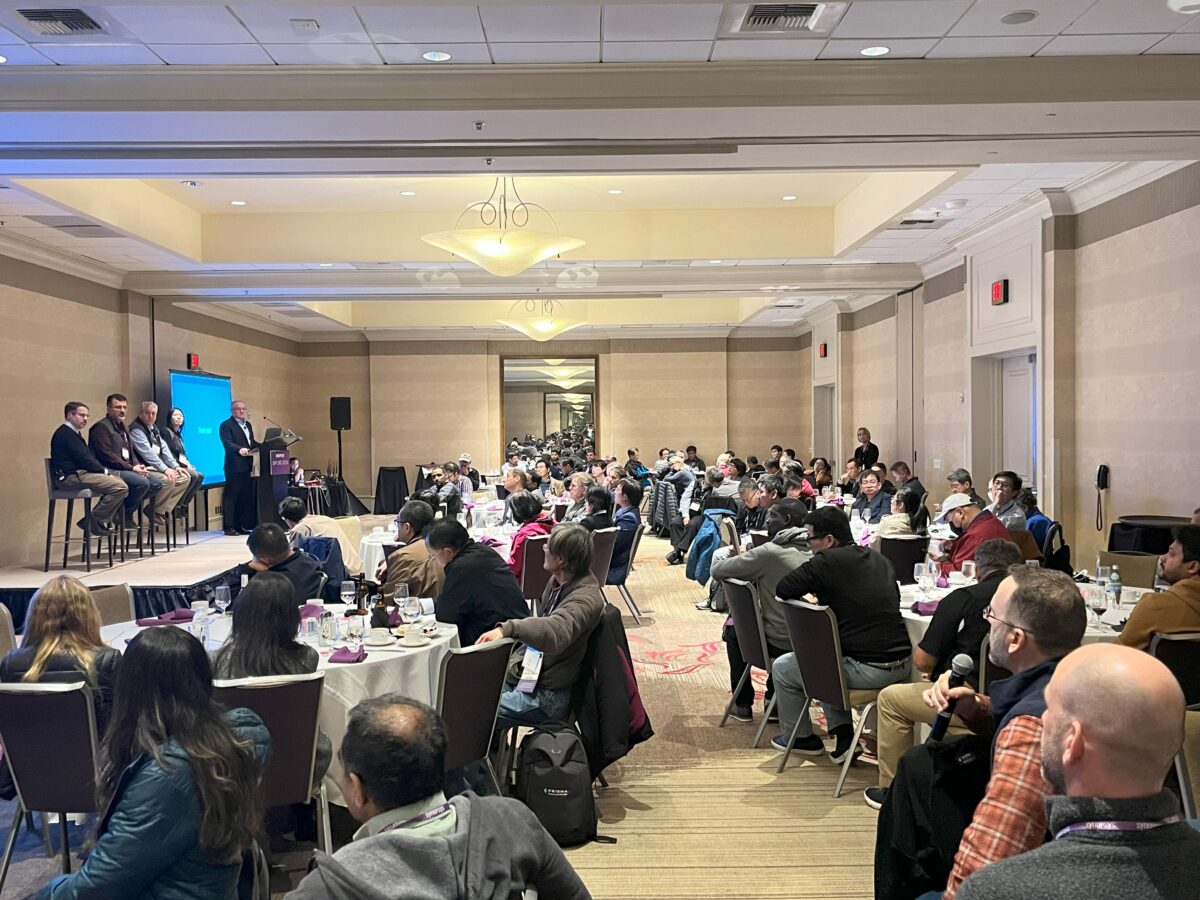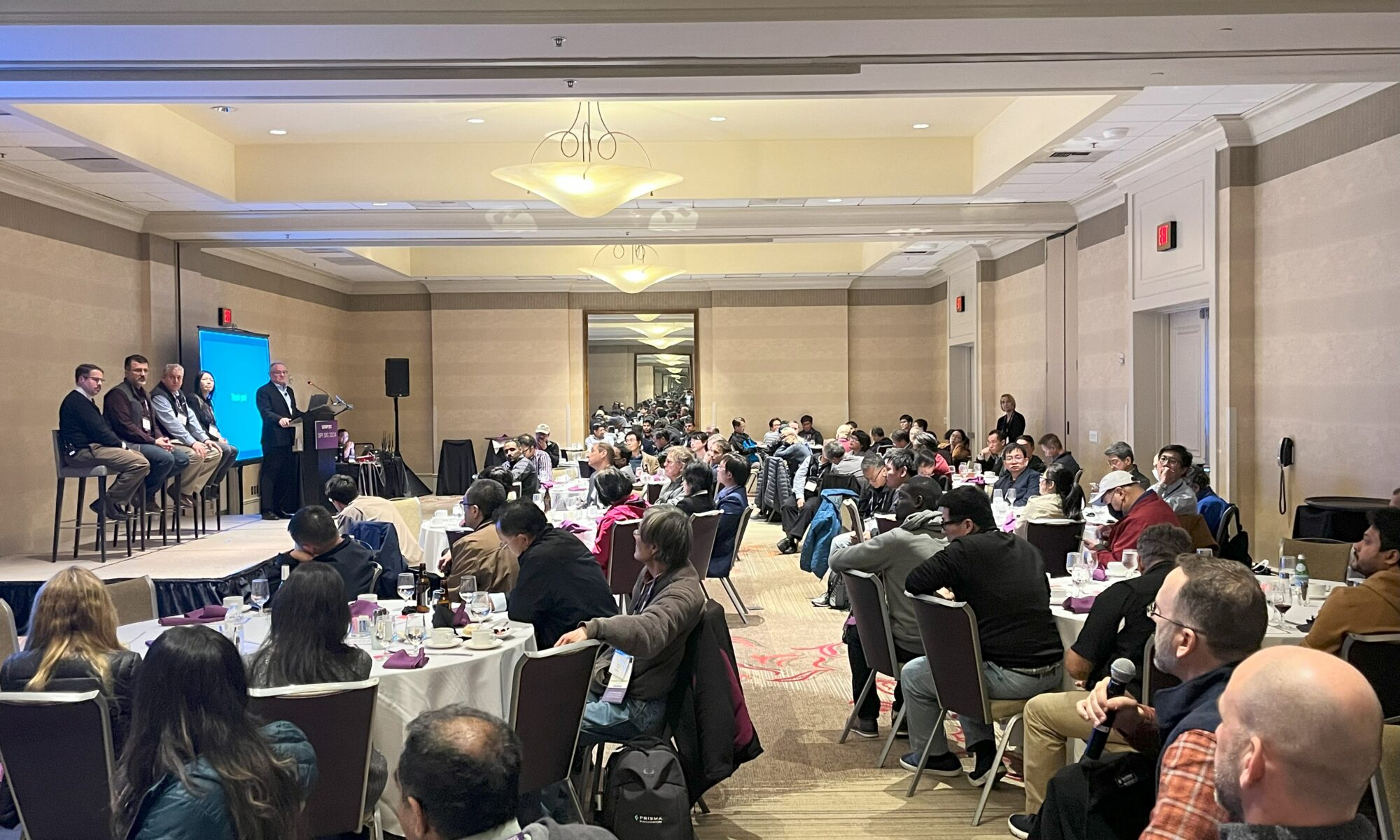
It was a dark and stormy night here in Silicon Valley but we still had a full room of semiconductor professionals. I emceed the event. In addition to demos, customer and partner presentations, we did a Q&A which was really great. One thing I have to say is that Intel really showed up for both DesignCon and the Chiplet Summit. Quite a few Intel employees introduced themselves and a couple even took pictures with me, great networking.
The SIPI SIG 2024 event was hosted at the Santa Clara Hilton on Jan 31st on the margins of DesignCon and was over-subscribed with 100 attendees (despite inclement weather). There were 20+ customers and partners represented including the likes of Apple, Samsung, AMD, TI, Micron, Qualcomm, Google, Meta, Amazon, Tesla, Cisco, Broadcom, Intel, Sony, Socionext, Realtek, Microchip, Winbond, Lattice Semi, Mathworks, Ansys, Keysight, and more:
Synopsys Demos & Cocktail Hour
Interposer Extraction from 3DIC Compiler & SIPI Analysis
TDECQ Measurement for High Speed PAM4 Data Links
Customer Presentations and Q&A:
Optimization of STATEYE Simulation Parameters for LPDDR5 Application
Youngsoo Lee, Senior Manager of AECG Package Development Team, AMD
IBIS and Touchstone: Assuring Quality and Preparing for the Future
Michael Mirmak, Signal Integrity Technical Lead, Intel
Signal and Power Integrity Simulation Approach for HBM3 Hisham Abed, Sr. Staff A&MS Circuit Design Engineer, Solutions Group, Synopsys
Signal Integrity at the Cutting Edge: Advanced Modeling and Verification for High-Speed Interconnects Barry Katz, Director of Engineering, RF & AMS Products, MathWorks.
All great presentations, the panelists had more than 100 years of combined experience, but I must say that Michael Mirmak from Intel was really really great. Here is a quick summary that Michael helped me with. Michael started his presentation with the standard corporate disclaimer:
“I must emphasize that my statements and appearance at the event was not intended and should not be construed as an endorsement by my employer, or by any organization of particular products or services.”
IBIS and Touchstone: Assuring Quality and Preparing for the Future
- IBIS and Touchstone are the most common model formats for SI and PI applications today
- Assessing model quality remains a constant concern for both model users and producers
- The simulation output log file is often neglected but can provide very useful insights, as it includes model quality reporting and issue detection outside of outputs such as eye diagrams, before actual channel simulation begins
- Even for high-speed IBIS AMI (Algorithmic Model Interface) simulations, problems can arise from simple analog IBIS data mismatches between impedance and transition characteristics; the simulation log can alert the user and model-maker to these early, before larger and potentially expensive batch runs
- The simulation output log can also help find issues with the algorithmic portion of IBIS AMI models that may distort output in subtle ways that cannot (yet) be checked with the standard parsing tool
- IBIS 7.0 and later supports standard modeling of modern, complex component package designs that tend to be represented using proprietary SPICE variants today; S-parameters under Touchstone are now included as well
- S-parameters using the Touchstone format are frequently used for interconnect modeling, but can become unwieldy when used to describe high-speed links at the system level over manufacturing or environmental variations
- Touchstone 3.0 is coming and is planned to include a pole-residue format that enables compression of S-parameter data
Congratulations to Synopsys and the semiconductor ecosystem, it was a great event, absolutely.
Also Read:
Synopsys Geared for Next Era’s Opportunity and Growth
Automated Constraints Promotion Methodology for IP to Complex SoC Designs
UCIe InterOp Testchip Unleashes Growth of Open Chiplet Ecosystem
Share this post via:






Comments
There are no comments yet.
You must register or log in to view/post comments.